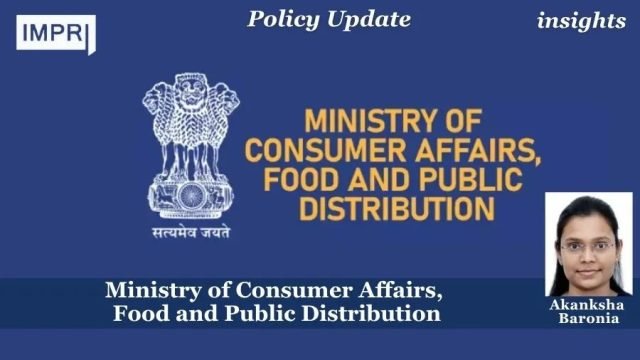Policy Update
Akanksha Baronia
“Food is National Security. Food is Economy. It is Employment, Energy, History. Food is Everything”. Ministry of Consumer Affairs, Food and Public Distribution was established to ensure the welfare of consumers and the efficient distribution of food grains, this ministry plays a crucial role in managing the nation’s food supply chain and protecting consumer rights.
Background
During the World War-2 India faced acute food shortages and to meet the exigencies a separate Food Department was established on 1st December 1942. Post Independence, the Food Department was re-designated as Ministry of Food on 29th August 1947. On 1st February 1951 the Ministry of Agriculture was combined with the Ministry of Food to constitute the Ministry of Food and Agriculture, for greater efficiency and economy.
In June 1991, and independent Ministry of Food was created. Finally in the new millennium on 17th July 2000, the then Ministry of Consumer Affairs and Public Distribution was renamed as the Ministry of Consumer Affairs, Food and Public Distribution, with two departments, namely Department of Food & Public Distribution and Department of Consumer Affairs, which is continuing till date.
Functioning
The Ministry of Consumer Affairs, Food and Public Distribution is a pivotal organ of Indian government, primarily responsible for formulating and implementing policies related to consumer rights and food security.
It consists of two Departments, namely, the Department of Food and Public Distribution and the Department of Consumer Affairs work under the overall guidance of Union Minister of Consumer Affairs, Food and Public Distribution.
The main functions of the department of Food and Public Distribution are:
- Formulation and implementation of national policies relating to procurement, movement, storage and distribution of foodgrains.
- Implementation of the Public Distribution System(PDS) with special focus on the poor.
- Provision of storage facilities for the maintenance of central reserves of foodgrains and promotion of scientific storage.
- Administration of food subsidies relating to rice, wheat and course grains.
- Policy matters relating to sugar and sugarcane sector, fixation of Fair and Remunerative Price(FRP) of sugarcane and formulation of national policies relating to export and import, foodgrain stocking norms, quality control.
- Participation in international Conferences, Associations and other bodies concerning food, i.e. International Wheat Council, World Food Council, International Food Policy Research Institute.
Main functions of the Department of Consumer Affairs:
- Enforcing Consumer Protection Laws
- Promoting Consumer Awareness
- Strengthening Consumer Grievance Redressal
- Monitoring Prices and Availability of Essential Commodities
Impact
The influence of MoCAF&PD on the food industry is profound, impacting various segments ranging from agricultural production to retail distribution.
- Strengthening Food Security: Achieving food security and improvement of nutrition- the second Sustainable Development Goal by 2030 is the most pressing development challenge in the world as per Food and Agriculture Organization.The government of India adopted a range of policies over the past 70 years in an attempt to improve the major food security.
Foodgrain production growth rate:
Source: Archives of Current Research International
- Enhancing Consumer Rights: With the establishment of the Consumer Protection Act, 2019, MoCAF&PD has enhanced the legal framework protecting consumer rights.
Source: https://share.google/WcVy3Utik7i079ruq
- Promoting Food Safety and Quality: The ministry’s commitment to food safety is underscored by it’s collaboration with the Food Safety and Standards Authority of India(FSSAI). Through rigorous regulation and monitoring, MoCAF&PD ensures that food products meet safety standards.
- Facilitating Market Access: MoCAF&PD plays a vital role in facilitating market access for farmers and food producers. By implementing policies that encourage the establishment of agriculture produce markets Committees(APMCs) and promoting direct selling models.
Government is also implementing a Central Sector Scheme, Agriculture Infrastructure Fund(AIF) of 1,00,000 Crore to provide a medium long term loan facility for investment in viable projects for post harvest market infrastructure.
Establishment of more than 120 private markets in the country.
Enabling farmers to digitally access large number of buyers and markets to get best discovered price.
- Encouraging sustainable practices: Encouraging organic farming and adopting environmentally friendly production methods have gained traction. These efforts not only bolster food security but also contribute to the sustainability of the food supply chain.
Source: S&P Global
- One Nation One Ration Card:
Emerging Issues
- Addressing Food Waste: As India struggles with food wastage, innovative solutions are needed to improve the efficiency of food distribution and consumption.
- Adapting to Technological Advancements: The rise of e-commerce and digital platforms presents opportunities for enhanced distribution, yet also poses regulatory challenges.
- Balancing Regulation and Innovation: While ensuring food safety, it is crucial to foster an environment that encourages innovation in food production and distribution.
- War Brings Opportunities: The conflict, despite infusing inflationary pressure on the economy, has also brought a few opportunities. While the country imposed a ban on wheat exports on May 13th to ease domestic supply constraints following concerns over sudden export growth, it has maintained exports through G2G contracts. About 1.8 million tonnes of wheat are being exported to several countries, including Bangladesh.
Way Forward
The Ministry of Consumer Affairs, Food and Public Distribution plays an essential role in shaping the landscape of the food industry in India. Through its multifaceted approach to consumer protection, food security, and quality assurance, the ministry not only safeguards consumer interests but also promotes the sustainable growth of the food sector. As challenges evolve, continuous adaptation and proactive policy making will be vital for ministry to effectively address the dynamic needs of the food industry and ensure the well-being of consumers across the nation.
References
About the Author: Akanksha Baronia is pursuing a postgraduate degree in Economics from Jawaharlal Nehru University, New Delhi. She is a research intern at IMPRI.
Acknowledgement: The author sincerely thanks Ms. Aasthaba Jadeja and IMPRI fellows for their valuable contribution.
Disclaimer: All views expressed in the article belong solely to the author and not necessarily to the organisation.
Read more at IMPRI:
Impacting, Research, Innovation and Technology (IMPRINT), 2015



















